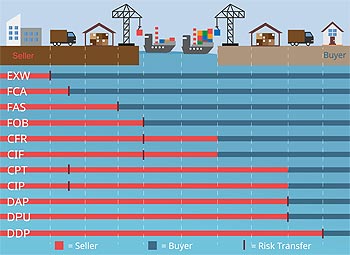What are Incoterms and how do I choose the right ones for international freight shipping?
 Before considering ocean and air shipping internationally, it's crucial to understand Incoterms, the internationally recognized set of rules that define the responsibilities of sellers and buyers at each transportation touchpoint along the way.
Before considering ocean and air shipping internationally, it's crucial to understand Incoterms, the internationally recognized set of rules that define the responsibilities of sellers and buyers at each transportation touchpoint along the way.Created by the International Chamber of Commerce (ICC), Incoterms are widely-used terms of sale covering all aspects of commercial shipping. They stipulate the parties responsible for paying for and managing specific shipments, related actions and undertakings for each leg of the shipment including who pays for insurance, customs clearance, documentation, ancillary transportation cost and other logistical activities.
Familiarizing yourself with Incoterms will help to make your shipments go smoothly and avoid extra headaches and expense.
The seven Incoterms 2020 rules for any mode of transport are:
- EXW - Ex Works (named place of delivery): The seller makes the goods available at their premises, or at another named place.
- FCA - Free Carrier (named place of delivery): The seller delivers the goods, cleared for export, at a named place (possibly including the seller's own premises).
- CPT - Carriage Paid To (named place of destination): The seller pays for the carriage of the goods up to the named place of destination.
- CIP - Carriage and Insurance Paid To (named place of destination): This term is broadly similar to the above CPT term, with the exception that the seller is required to obtain insurance for the goods while in transit.
- DAP - Delivered at Place (named place of destination): The seller delivers when the goods are placed at the disposal of the buyer on the arriving means of transport ready for unloading at the named place of destination.
- DPU - Delivered at Place Unloaded (named place of destination): This Incoterm requires that the seller delivers the goods, unloaded, at the named place of destination.
- DDP - Delivered Duty Paid (named place of destination): Seller is responsible for delivering the goods to the named place in the country of the buyer, and pays all costs in bringing the goods to the destination including import duties and taxes.
The four Incoterms 2020 rules for Sea and Inland Waterway Transport are:
- FAS - Free Alongside Ship (insert name of port of loading)
- FOB - Free on Board (insert named port of loading)
- CFR - Cost and Freight (insert named port of destination)
- CIF - Cost Insurance and Freight (insert named port of destination)
The DGX International Pricing manager highlights the importance of becoming familiar with incoterms:
“Not understanding different Incoterms can end up costing the customer large amounts of money. As an example, booking a shipment as DAP when the correct terms should be DDP can have catastrophic consequences. The consignee may not be fully aware of their responsibility to clear Customs and may not meet import requirements timely or at all.
Additionally, they may be caught unprepared to cover applicable duties, taxes and other custom related fees. Delays in customs clearance may result in extra charges incurred and can even lead to the unclaimed cargo being seized by Customs authorities. Storage/demurrage fees charged by the port terminals and detention fees assessed by the ocean carriers can quickly add up and may amount to thousands of dollars. These charges are ultimately the responsibility of the shipper.”
The Import manager for DGX agrees:
“From an import point of view, the consignee should always verify with their seller the terms of the shipment at the time of purchasing the product. This will ensure the consignee knows exactly what they're paying for - whether it is just the product itself or the product and possibly part of the shipping costs.
Discussing the Incoterms with the seller should arm the consignee with a clear understanding of their obligations from the beginning. This knowledge will help avoid surprise fees once the cargo arrives at the destination. When incoterms are not discussed and agreed on ahead of time, it can create confusion and delays.”
While making sure Incoterms are agreed upon by all parties is ultimately the responsibility of the seller, DGX-Dependable Global Express is well-versed in logistics matters and ready to lend a hand with the details surrounding your shipment.
As part of the personalized attention provided every customer, DGX assigns a dedicated sales agent at the front end of your shipment planning. For more information, call us at (888) 488-4888 Ext. 2011 or email us.
An overview of the 2020 version of Incoterms is available here on our website. For more detailed information, visit here.You may also request a free Incoterms wallchart for ease of reference here.